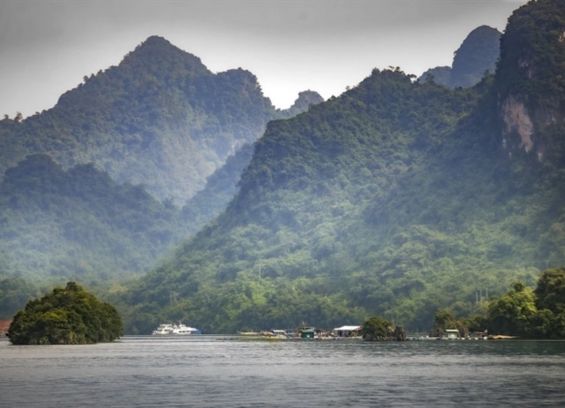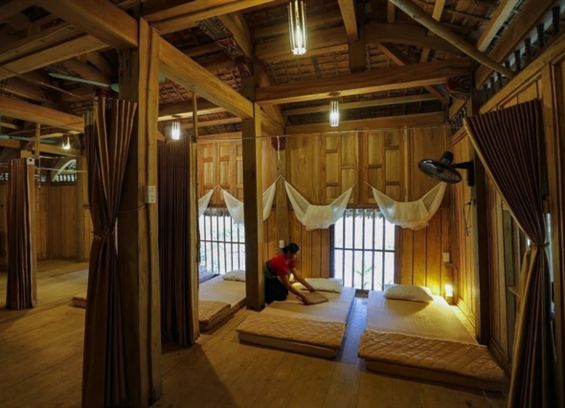Upon arrival, visitors are greeted by the fresh air and stunning vistas of the hydroelectric lake area. The hamlet offers a glimpse into the vibrant culture of the Mường Ao Tá people, characterised by traditional stilt houses, ethnic cuisine and the warmth of local hospitality.

Đá Bia is a small hamlet of the Mường Ao Tá people, located right next to Hòa Bình hydroelectric lake.
Nestled along the serene shores of Hòa Bình Lake, approximately 32km from the bustling centre of Đà Bắc District, this Đá Bia community tourist site in Tiền Phong Commune has emerged as a captivating destination on the tourist map of Hòa Bình Province. Its enchanting landscape and rich cultural heritage have drawn numerous visitors eager to explore this unique setting.
In 2019, Đá Bia Hamlet was honoured with the ASEAN Community Tourism Award, a testament to its commitment to sustainable tourism. The village’s journey began in June 2014 when the Australian NGO Action on Poverty collaborated with the People's Committee of Đà Bắc District to launch the 'Community Tourism in Đà Bắc' project, selecting Đá Bia as a key site for development.
Upon arrival, visitors are greeted by the fresh air and stunning vistas of the hydroelectric lake area. The hamlet offers a glimpse into the vibrant culture of the Mường Ao Tá people, characterised by traditional stilt houses, ethnic cuisine and the warmth of local hospitality.
A homestay in Đá Bia Hamlet, Đà Bắc District. Photo: Vietnamnews
Journey to a picturesque hamlet
After a leisurely 1.5-hour boat cruise on Hòa Bình Lake, our group arrived at Đá Bia Hamlet. The sight was simply breathtaking: stilt houses perched on limestone cliffs, harmoniously clustered together without walls, fostering a sense of community and connection among families. Climbing up to a homestay, we were treated to a panoramic view of the glistening lake, dotted with rocky islands and floating fish cages.
The village is home to about 40 households of the Mường Ao Tá people, who historically lived in isolation, relying solely on boats to navigate the lake. Only in the past few years, a road was built, connecting Đá Bia to the outside world, allowing visitors to discover its untouched charm. The locals practise a self-sufficient lifestyle, raising their own livestock, cultivating mountain vegetables and fishing. Recently, the introduction of cage fish farming has allowed villagers to sell their catch, providing fresh produce for the growing number of tourists.

Resting space for tourists at Ngọc Nhềm Homestay in Đá Bia Hamlet. — VNA/VNS Photo Trọng Đạt
With a strong desire to showcase their unique traditions, the people of Đá Bia have established an art troupe, investing in traditional costumes and musical instruments to entertain visitors. Tourists have the opportunity to stay in traditional Mường stilt houses, which are not only architecturally stunning, but also a testament to the cultural heritage of the Mường people. The design of these houses is symbolic - they are said to resemble a turtle, with their four main pillars representing the turtle’s legs.
Lò Thị Trang, owner of Lake View Homestay, said: “All the villagers are Mường Ao Tá and our costumes reflect our unique identity. Five households are engaged in community tourism, working together to promote our culture. Our meals feature traditional dishes made from locally sourced ingredients like river fish, wild vegetables and garden chickens, all served in eco-friendly utensils like bamboo chopsticks and baskets.”
Tourists take a cruise ship from Bích Hạ Port, Hòa Bình City to Đá Bia Hamlet. Photo: Vietnamnews
Array of experiences
Đá Bia offers a plethora of activities for visitors, including rafting, kayaking, swimming in waterfalls and exploring nearby caves. Tourists can also engage in hands-on experiences like vegetable picking, gathering bamboo shoots and fishing, immersing themselves in the local lifestyle.
One of the most charming features of Đá Bia is its self-service shop model. Scattered throughout the village, small huts display local products and agricultural goods. Instead of direct transactions, visitors place their money in a pre-set box corresponding to the displayed prices, fostering a sense of trust and security within the community.
Bùi Văn Cường, a recent visitor, expressed his delight: “I was captivated by the beauty of Đá Bia Hamlet. It’s an ideal spot for community tourism, enhancing the livelihoods of local farmers. The warm welcome from the locals and the delicious traditional dishes made our experience unforgettable. The self-service shop model is particularly impressive, it reflects the strong sense of security and community here.”
Chairman of the Đà Bắc District People's Committee, Lường Văn Thi, noted: “Each year, we welcome nearly 100,000 domestic and international tourists, creating jobs for thousands along the lake. Our tourism development project aims to make Đà Bắc a premier tourist destination, boosting local incomes and contributing to the state budget.”
With a focus on high-quality tourism, Hòa Bình Province, alongside various NGOs, has provided support and guidance to local farmers to enhance their tourism offerings. This collaborative effort has led to the preservation of the environment and the rich natural resources surrounding Hòa Bình Lake, ensuring a clean and appealing landscape for tourists.
Peaceful life of people living along Hòa Bình hydroelectric lake. Photo: Vietnamnews
Đà Bắc community tourism experience programme has become increasingly popular among international visitors, who are drawn to its unspoiled nature, unique culture and joyful activities. Tourists enjoy learning about local customs, visiting traditional homes and sampling authentic cuisine.
For those who seek adventure and cultural immersion, Đá Bia Hamlet remains an undiscovered treasure. With its breathtaking landscapes and the warmth of its people, it promises a rich tapestry of experiences for those willing to explore its depths. Whether you're a nature enthusiast, a cultural explorer, or simply looking for a peaceful retreat, Đá Bia invites you to uncover its hidden wonders.
VNS